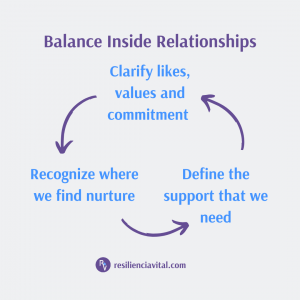When I think about the topic of relationships, I think about our need for balance. Relationships usually start with a feeling of intensity: That first date, that first “I love you,” the first time meeting the family, the fights that end with declarations of love, among other things. That intensity is lovely, it gives us a “high” that becomes an essential part of our attraction. At the same time, that intensity can many times blind us from the reality of our deepest needs, dynamics, and expectations that we have in a relationship. Additionally, it could also happen that we think that “love” can conquer everything. However, the truth is that many times we need much more than love to create and sustain a relationship throughout our life.
A lot of people associate balance with dull or with the fact that they are settling. I would call it an invitation to an opportunity to obtain clarity about the status of our relationship. And to finally consider and act based on what you need and not about the expectations that we receive about our relationship.
There are several themes, elements, and circumstances that can affect a relationship: age, the people who are part of the relationship, the stages that they are facing, infidelities, economy, the presence or absence of children, etc. This list is why, in this blog entry, we will focus on three central elements with which I work on my sessions.
However, don’t let these elements fool you. From these three, we can create a lot of insight, not only regarding the relationship but also about each individual.

Balance Inside Relationships. Created by Alejandra Matos
What do I mean by clarifying likes, values, and commitment?
I mean, to take the time to see what we have in common with our partners. Our partners don’t need to be like us in every way. However, they should head towards the shared goal that is our relationship. As the relationship progresses, we can feel that we have synchrony. Because of this, we can assume that this will remain for the rest of the relationship. However, we need to evaluate what we di share with our partners. On that same note, it can also happen that we feel like we have nothing in common with our partner, and we don’t know if we should continue with the relationship. Due to these different reactions, I invite you to make yourselves the following questions:
- What do you enjoy doing with your partner? How do you spend quality time?
- Do you create space to spend time intentionally (meaning, you plan it and make it a priority), or do you simply think things will just happen?
- What are your life values? What are the values that you share with your partner? How do you manage when these values collide?
- When was the last time that you and your partner sat down to talk about the future of your relationship? Do you feel safe having this conversation?
The topic of commitment to the relationship is essential. Sometimes we enter a relationship thinking that the person will eventually meet us on our level of commitment that we already feel.
Frequently, people have different expectations as to how commitment looks like in a relationship. These conversations can feel like they will compromise the relationship or that we will have to face a reality that we don’t want to see. If this is the reaction that rises in you, then it is clear that there is a topic, whether it’s personal or in the partnership, that needs to be addressed.
The second element that I mention is to “Recognize where we find nurture.” Many times, in my sessions, I listen to people complain that their partner is not as available lately, or that they feel that they are not a priority to their partner. In the first place, we would need to assess if there is some negligence happening in the relationship. However, many times I find that the person who is presenting the complaint generally does a nervous laugh when I ask them if they have spaces in which they find satisfaction outside of their partner. Many times, the responses that I get are “No, it’s just that I do everything with my partner “It’s that, if my partner isn’t there, I don’t feel the desire anymore” “It’s that people will think that something’s wrong if they see me without my partner.” Occasionally, I also get a glimpse of how the partner impacts their independence: “It’s that my partner thinks that I am abandoning them if I ask them for time to myself or if I don’t include them on my activities.”
Independence in a relationship is an aspect that shouldn’t be negotiable. In a relationship, you share a goal, but you don’t share the same path. We are a separate being from our partner and our relationship.
This is why it is crucial to create spaces and other relationships that nurture us separate from our partners to maintain a balance. These can be our hobbies, classes, professional goals, different friend groups, spending time with our families, our spirituality, etc. Placing the responsibility of our satisfaction exclusively in our partners will drain our relationship and could create some codependency. Since sometimes, independence can be impacted by the way our partners perceive themselves, I invite you to talk to your partner. Communicate about what this independence means, and the wounds or fears that this decision might be triggering. Additionally, you can talk about how you can support them through these emotions and reactions without compromising something vital to you.
Lastly, we have “defining the support we need” from our partner. Sometimes, we think that our partner is not aware of our achievements or our struggles because we are not receiving the reactions or feedback that we expected. Furthermore, it can also happen that we are feeling good with the support of our partner, but the people around us and their comments make us feel insecure. Sometimes, we might say, “Oh! But it’s that this person’s partner does these, but mine doesn’t…so that means that there is something wrong with our relationship”.
A first step that I suggest identifying the support that we need is to consider the following categories. Then, proceed to assign one or several to different aspects, projects, and needs in our lives. And to try to do it in the most specific way possible.
The categories are:
- Consistent: I need consistent support from my partner. This means their feedback, that they ask me how I am managing, and that we can work towards solutions.
- Validation: I just need my partner to listen to me and make me feel like they are there for me. I can make my decisions and complete projects, but I want to feel that support.
- Support: I would like for my partner to be there for me when I have a question about a project or decision I need to male. I want to feel like I don’t need to have all the answers and that my partner can be there for me.
- By choice: I can provide my partner with information about what I am doing and wanting to achieve, but I don’t need constant feedback or for them to take the initiative on the follow-up.
An example of how this can play out:
- Regarding raising our children, I need consistent support from my partner, but when it comes to how to manage my brand, I just need validation.
- When it comes to working out, I don’t need my partner to be involved in my process. I can choose to share with them what I do, and I welcome if one day they want to join me. But my enjoyment and my desire to workout do not depend on their support.
I am sure that I will redefine these categories with time, and that each one will be different for each person, stage, and growth process. These categories don’t have to be definitive, but a language that we can use to align ourselves with what we desire and not with what society and the people around us might have imposed on us.

With this idea, I end this entry about how to start developing balance in our relationships. These three elements are not the end recipe to achieve it, but to begin to establish conversations and developing intentionality when we choose how and with whom do we form relationships.
Relationships are fluid, and with their shifts, they invite us to face new challenges. At the same time, these transformations allow us to learn who we are and want to be, inside and outside of our relationships.
If you want to learn more about this topic, I invite you to see my Youtube video (in Spanish) titled “How to communicate our wants and needs” And if you desire more clarity regarding your relationship and how to manage it, I invite you to get in contact with me to see how I can support you on your journey.
Add a comment
0 Comments